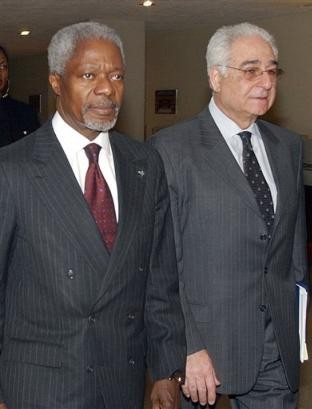
 Statement on Behalf of Benon V. Sevan
Statement on Behalf of Benon V. Sevan
More than a year and a half after Benon Sevan left the
Benon Sevan has served the UN for forty years in some of the most difficult assignments in the world?including
It is important to note what the indictment does not charge. This indictment does not charge– because it cannot?that Mr. Sevan ever took any action or failed to take any action other than in the best interests of the Oil – For-Food Programme and the United Nations. Apparently, however, the US Attorney has simply adopted the Volcker Committee?s unfounded conclusions. Mr. Sevan had fully accounted for and reported any payments he received beginning in 1999. The only acts referenced in the indictment by Mr. Sevan are two cash deposits, one of $5,000 in August 2001 and $1,200 in January 2002. Mr. Sevan fully disclosed all of his banking records as well as the fact that, throughout his career travelling for the United Nations, he made and withdrew such sums in cash frequently. The indictment also charges that surcharge payments were made by a certain Mr. Nadler, an acquaintance of Mr. Sevan, to
It is ludicrous to contend that in 1999 Mr. Sevan disclosed fictitious gifts from his aunt on his forms in anticipation of misleading investigators eight years later. These same baseless allegations were made nearly two years ago, while Mr. Sevan still was working for the UN. No action was taken. Instead the US Government has waited nearly two years to issue a ceremonial charge long after Mr. Sevan?s retirement and return to his home country. There is no doubt that there has been financial fraud and ineptitude by the
Eric L. Lewis – Baach Robinson & Lewis, PLLC
Counsel to Mr. Sevan
Contact: [email protected]
Source: “Gibrahayer” e-magazine, 18 January 2007
http://gibrahayer.cyprusnewsletter.com
ADDITIONAL
Former UN official charged in Iraqi oil-for-food scandal
Sales skirted
By Julia Preston
The seven-count indictment, unsealed Tuesday in U.S. District Court in
Sevan has known for some time that he was under federal investigation. The charges echo an Aug. 8, 2005, report by a commission headed by Paul Volcker, a former Federal Reserve chairman, which found that Sevan had profited from illicit transactions with the trader, Fakhry Abdelnour.
The indictment highlights the lingering corruption scandals at the United Nations in the first weeks of the term of a new secretary general, Ban Ki Moon, a South Korean. The Volcker commission concluded that the United Nations needed “thoroughgoing reform” of its management. So far Ban has not made clear whether he intends to carry out sweeping change.
Nadler is the brother of Leia Boutros- Ghali, the wife of the former secretary general of the United Nations, Boutros Boutros-Ghali. Abdelnour is also related to Boutros- Ghali, who is from
Abdelnour was the president of a small company, African Middle East Petroleum, and the Volcker commission said that Nadler was its treasurer. The indictment describes an August 2001 transaction in which it says Abdelnour arranged to purchase one million barrels of oil from
Soon after, the indictment says, Abdelnour transferred $50,000 to a Geneva bank account belonging to Nadler. At a meeting in
Sevan's lawyer, Eric Lewis, called the allegations “ludicrous.” He said Sevan had received cash payments in that period from an elderly aunt who was giving away her assets. Sevan fully declared the gifts in his UN financial disclosures, Lewis said.
“Whatever arrangement Mr. Nadler had with Mr. Abdelnour, Mr. Sevan had no knowledge,” Lewis said. He said the government was trying to distract attention from “financial fraud and ineptitude by the
The UN program was set up to ease the impact on Iraqi citizens of international sanctions by allowing
After leaving the program, Sevan remained at the United Nations on a salary of $1 a year while Volcker's investigation was under way. On Aug. 7, 2005, one day before Volcker's report was released, Sevan resigned and moved back to
Federal prosecutors said they would seek his extradition. If found guilty, he faces a maximum of 50 years in prison. Nadler is also out of the country, but prosecutors did not say where.
Source: International Herald Tribune, 17 January 2007
http://www.iht.com/articles/2007/01/17/news/nations.php
